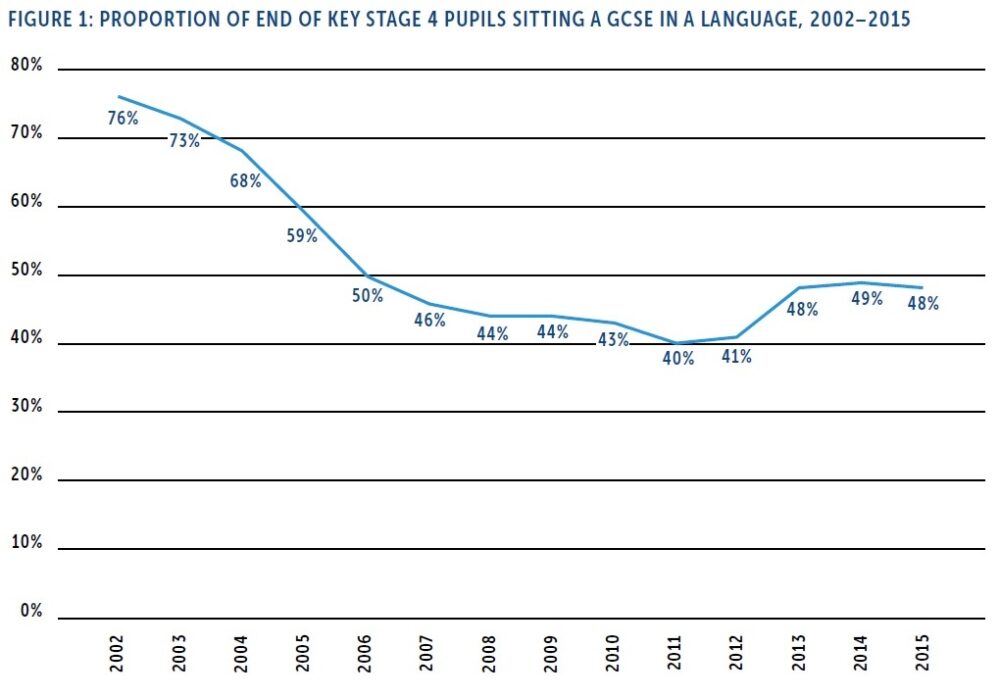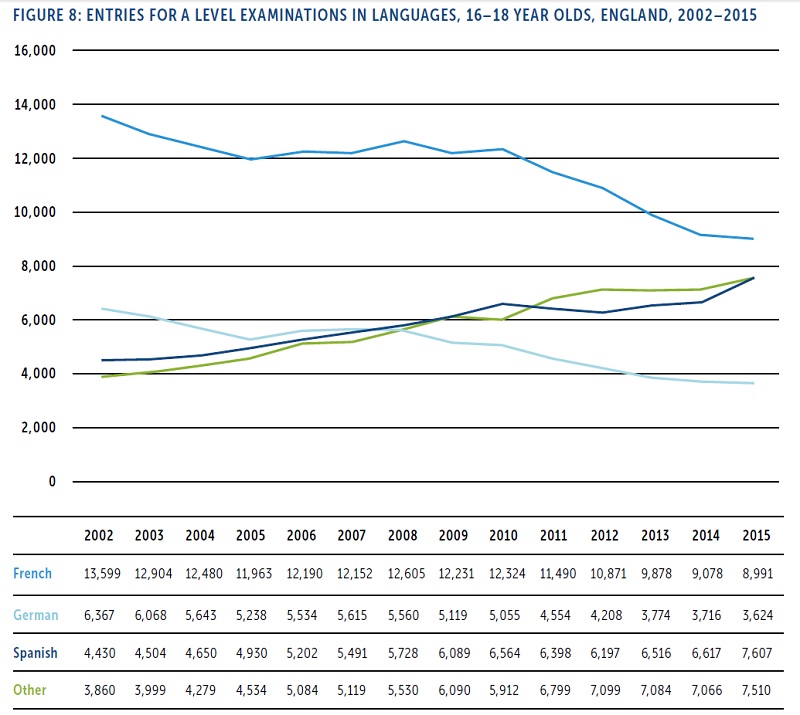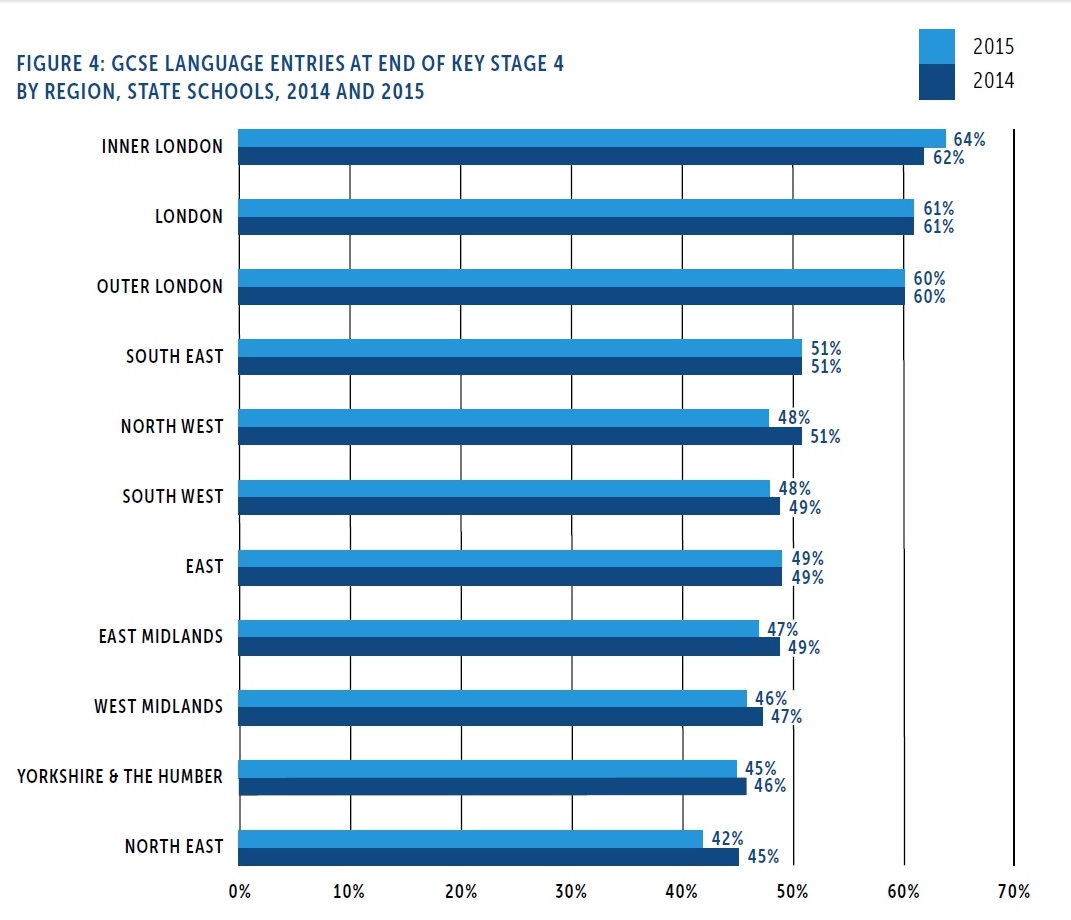Language experts have warned about a shortage of language skills among young people, as new figures show a decline in take-up.
The Language Trends Survey, published today by the British Council and Education Development Trust, highlights a number of challenges facing language teaching.
After the introduction of the English Baccalaureate (EBacc), which requires every current year 7 to study English, maths, science, history or geography and a modern foreign language until they are 16, there was an initial increase in the proportion of pupils taking a language at GCSE, but this number has now stagnated.
There been no improvement in take-up of languages post-16, with the number of A-level entries in French and German continuing a decade-long drop.
Report authors said while more pupils are taking Spanish and other languages, it does not make up for the shortfalls in French and German.
Experts have previously warned that schools need to find a further 3,500 language teachers to be able to teach the subject properly in the coming years.
There is wide variation in the proportion of pupils sitting a GCSE in a language across the country – 42 per cent of pupils in the north east compared with 64 per cent in inner London.
The report said some state schools believe post-16 languages are “financially unviable”.
The report does, however, give a positive nod to the primary sector, stating that 42 per cent of primary schools have increased resources available for languages, and all surveyed schools taught the subject.
But secondary schools reported that the quality of teaching at primary school is not consistent and pupils did not have a “worthwhile level of knowledge to apply their studies at secondary” level.
Teresa Tinsley, report co-author, said: “Languages are already one of the harder GCSEs and teachers fear that with the new exams it will be even tougher for pupils to get a good grade.
“Combine this with the expectation that a wider range of pupils will be sitting the exam and it is not surprising that teachers feel embattled. Improving their morale and confidence in the exam system is crucial if languages are to thrive in our schools.”
Mark Herbert, Head of Schools Programmes at the British Council, said: “If the UK is to remain competitive on the international stage, we need far more young people, not fewer, to be learning languages in schools.
“The country’s current shortage of language skills is estimated to be costing the economy tens of billions in missed trade and business opportunities every year.”
Tony McAleavy, director of research and development at Education Development Trust, added: “It is encouraging to see primary school teachers continuing to value teaching languages, though there is a clear need for more curriculum time to be made available for the subject.”
A Department for Education spokesperson said: “As global communication becomes easier, we know that employers increasingly prize the ability to speak a foreign language. That’s why we made languages a compulsory part of the primary curriculum and since 2014, we have seen an increase in the take up of language A-levels.
“By introducing the Ebacc, we have stopped the decline in modern foreign languages seen in the last decade, where 200,000 fewer GCSE students studied a modern language in 2010 than in 2002. Last year’s results showed 20 per cent more pupils are taking languages at GCSE than in 2010 while A-level entries in modern languages have increased by nearly 4 per cent since 2014.”









It’s difficult to know where to start with this – “Little Englander” isolationist island mentality, laziness, the position of English as a world language, tabloid antipathy to anything foreign,severe grading, perceived difficulty and irrelevance, parental indifference (at best, massaging options to optimise results and therefore league table position,a curriculum which lacks intrinsic interest for students, an assessment regime that is inflexible and allows students’ weaker areas of performance to drag down their overall attainment and doesn’t play to any strengths they might have, all of these are contributory factors. The tragedy in all of this is that as a community language teachers are extremely hard working, innovative, energetic and passionate about their subject. That’s not to say that teachers of other subjects aren’t, but they haven’t got the boulder of Sysyphus to roll up the hill every day. We were well on the way to addressing some of these issues when Gove threw out the entire bathroom as well as the baby wiht the bathwater and set out cause back by at least a decade. The inconsistency in teaching quality in KS2 is well known in the community, but our momentum in addressing this issue was severely curtailed because it took Gove 3 years to decide whether or not to make languages compulsory in primary schools. By the time he had made this decision, local authorities had been stripped bare of any consultancy support and any central co-ordination and drive had been dismantled. Schools were left to get on with it, not knowing where to go to get help, support and training. Many dedicated and extreme;y talented colleagues found their posts deleted, and were forced to go independent as a result. The overriding factor in all of this is a government which has a blind obsession with destroying any form of localised, organised support, and has effectively binned a vast amount of imaginative, engaging and challenging work in this area, at significant cost to the taxpayer. “If it ain’t broke don’t fix it” has become “If it ain’t Tory, break it”.Languages will continue to wither on the vine without a significant change in the mindset of parents, ministers and assessment quangos. Don’t hold your breath.
Thanks for any other magnificent post. Where else may anybody get that type of information in such a perfect method
of writing? I’ve a presentation next week, and I’m at the search for such info.
I am a parent and want my daughter to do well in languages and since Year 7 has had lessons in French and Spanish. What is frustrating is the quality of teaching in one of these languages and the behaviour management of the class which has sapped her enthusiasm for the subject. She is going to try German now from Year 9 as we can see how important a language is in the current climate.
i am holding German nationality as like my daughters.now gcse exam for german language is stopped by school.i my self banged head,no proper advice.help my daughters.
Thanks.